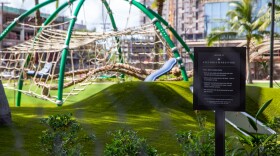The state is moving closer to implementing a temporary rule intended to help protect Molokaʻi from the invasive coconut rhinoceros beetle.
The state Advisory Committee on Plants and Animals, under the Department of Agriculture and Biosecurity, agreed Wednesday that the rules protecting the island from CRB are insufficient, and that the need to do so constitutes an emergency.
The committee also supported a community-led petition to prohibit the import of material, such as mulch and other green waste, that could harbor the beetle.
CRB’s primary targets are palm trees, like coconut trees, but it can also attack other important Hawaiʻi crops, such as taro and banana.
“This situation here is very, very important to our future, as the niu (coconut) is our tree of life,” said community member Kunani Nihipali at Wednesday’s meeting. “We need to continue to preserve, perpetuate and protect it because it's part of our lifestyle.”
Kunani and Ipo Nihipali spearheaded the petition and effort to implement an import rule.
It’s a big step for those who have been advocating for a thorough set of rules to keep the CRB from reaching Molokaʻi – the last of the main Hawaiian Islands where the beetle has yet to be detected.
The community-drafted petition would prohibit the movement of potted or bare root plants, decaying plant material, trimmings, fruit and vegetative scraps, wood, compost, soil and gravel from being transported to Molokaʻi from any other part of the state.
The petition and proposed rule were first heard by the state Board of Agriculture and Biosecurity in August, and garnered initial support from the board.

Supportive testimony inundated both that meeting and Wednesday’s.
Native Hawaiian advocate and Molokaʻi resident Walter Ritte said that food is particularly expensive on the island because of shipping logistics, and that depending on natural resources is important for its 7,400 or so residents.
“Eating is very, very expensive. So that's why we're really dependent upon what nature gives us, whether it's going to be animals like deer or from the reefs, the fish,” Ritte said. “One of the things that we're really proud about is our ability to use our natural resources in order to survive. So, when we have threats like this, it's really critical to us on Molokaʻi.”
While the community petition called for a more thorough interim ban, the committee was given an alternative proposal from the DAB’s Plant Quarantine Branch, which was concerned that a ban would be too restrictive to the movement of goods, while not being a strong enough deterrent to CRB.
The PQB’s version would be more limited in scope, and could be circumvented through a permit by the state Department of Agriculture and Biosecurity.
”One of the biggest things is because this is a prohibition, there’s no way for any of these goods to be imported or be sent to Molokaʻi for any reason. And one of the biggest issues that we've seen is what happened in Lahaina, where after the fires there was a significant need for a lot of this material,” said Jonathan Ho, PQB’s manager, at the meeting.
“Knowing how CRB spreads… The goods that are subject to the proposed regulation are clearly high-risk pathways, but they're not the only pathway. And a lot of those other pathways are unregulated at this time,” Ho said.
He worried the rule would set a precedent and have unintended consequences.
But opponents said the protective measure could be necessary after 12 years of allowing CRB to spread across the islands.
“I understand precedent-setting, but it's not a precedent that's not doable if we have the right resources. Allow us this opportunity," Kunani Nihipali said.
The committee’s decision will be considered by the state Board of Agriculture and Biosecurity, which can establish an interim rule to implement the ban.
Hawaiʻi Public Radio exists to serve all of Hawai’i, and it’s the people of Hawai’i who keep us independent and strong. Help keep us strong to serve you in the future. Donate today.






